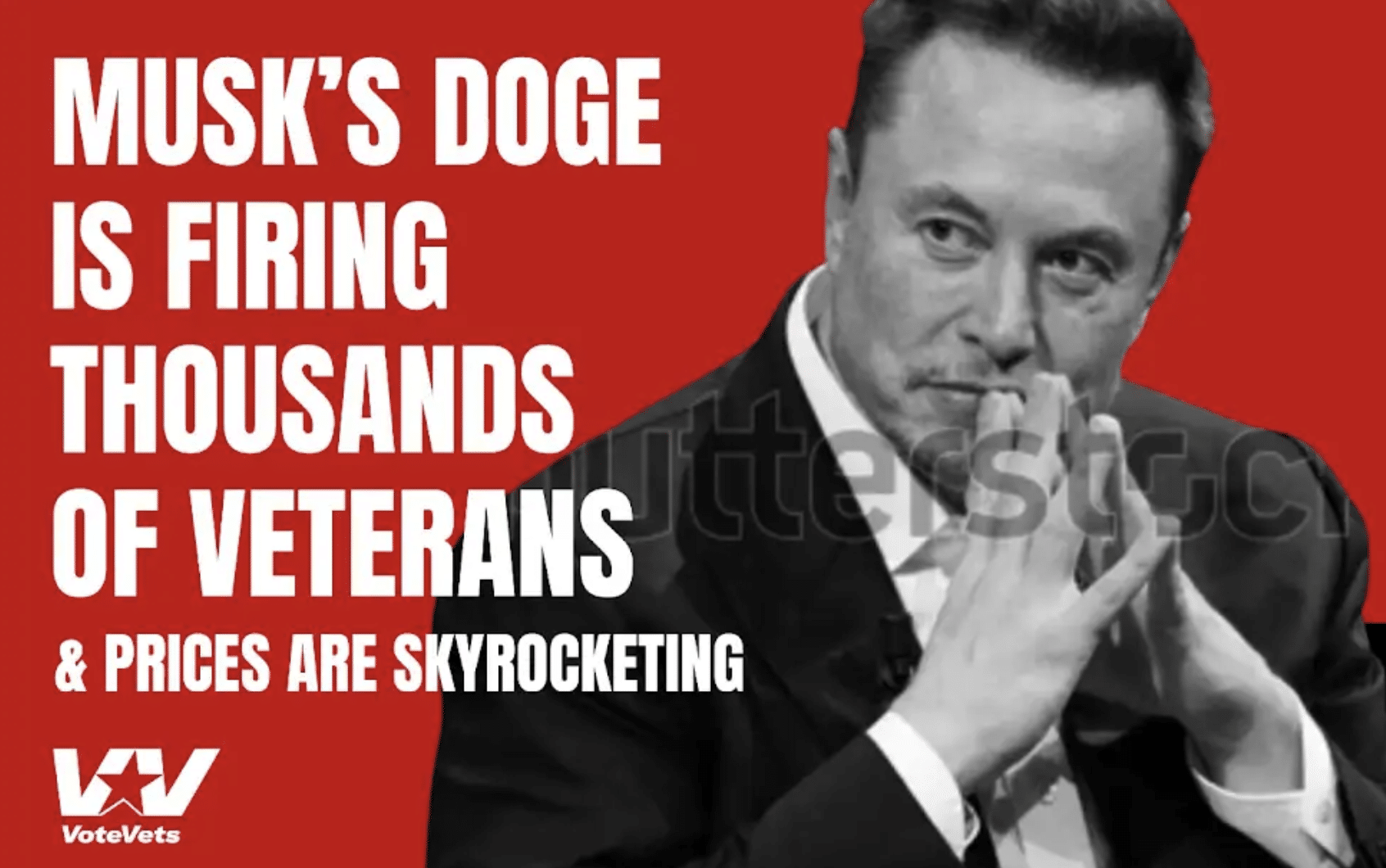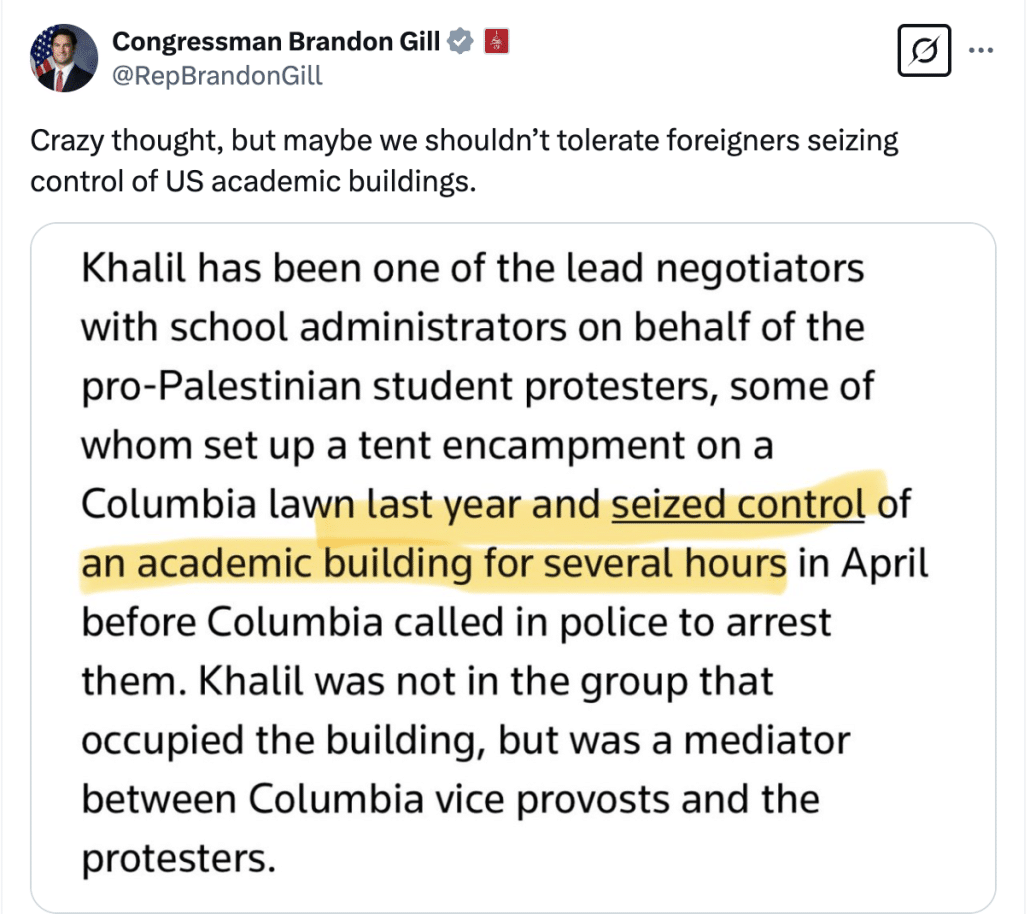Talking about Chuck Schumer Will No More Save Democracy than Chuck Schumer Will
The State of the Union was 20 days ago. Since that day, Democrats have spent much of their time talking about other Democrats, talking about how Democrats are responding to the assault on the country, rather than talking about the assault itself and the people responsible.
In my opinion, focusing on Chuck Schumer — however justified your opinion about his fecklessness — is every bit as feckless as Chuck Schumer’s response to this crisis.
What has happened since the Continuing Resolution
There are a slew of reasons I think focusing on Chuck Schumer distracts from the matter at hand. One is that his view that the Continuing Resolution was less bad than a shutdown seems to have been a defensible good faith view (though that doesn’t excuse his head fake about it). It’s certainly possible that Democrats would have messaged effectively during a shutdown and used it to waken Americans of the risk Trump’s attacks on government pose (though as I said at the time, no one had laid the ground work for effective messaging, which makes me question how effective they might have been). But keeping the government open has allowed other positive developments.
Not shutting down the government at least temporarily affirmed the import of employment law. Last week, 25,000 government workers were reinstated pursuant to the efforts of two people whose lawsuits delayed their own firing long enough to issue judgments deeming the firings targeting probationary workers illegal, and then two judges (one, two) who ruled the firings to be unlawful (Trump has appealed the California one of these decisions to SCOTUS). Their reinstatement not only gave people paychecks until such time as Trump fires them properly — paychecks they would not have had under a shutdown — but it affirmed the import of following employment law.
Not shutting down affirmed the import of Congressional funding. On March 18, Radio Free Europe used the Continuing Resolution to substantiate its appropriations-related challenge to the shutdown.
28. On March 15, 2025, President Donald J. Trump signed into law Congress’s FullYear Continuing Appropriations and Extensions Act, 2025 (“Third Continuing Resolution”), which, like the previous continuing resolutions, appropriated “[s]uch amounts as may be necessary, at the level specified . . . under the authority and conditions provided in applicable appropriations Act for fiscal year 2024” until September 30, 2025. See H.R. 1968, 119th Cong. § 1101(a) (2025).
29. In sum, Congress appropriated approximately $23 million for RFE/RL in the First Continuing Resolution for October 1, 2024, to December 20, 2024. Congress appropriated approximately $41 million to RFE/RL in the Second Continuing Resolution for December 21, 2024, to March 14, 2025. Congress further appropriated approximately $77 million for RFE/RL in the Third Continuing Resolution for March 15, 2025, to September 30, 2025.
Obviously, the legal posture of this, and similar cases, would be different if Trump had not signed a funding bill.
Not shutting down kept Trump on the hook for any collapse of Social Security. After Judge Ellen Lipton Hollander enjoined DOGE from tampering in Social Security, the Acting Commissioner Leland Dudek attempted to pick a fight with the judge, falsely claiming her order would force him to shut down Social Security entirely.
She wrote two letters basically calling him a dumbass, stating that DOGE can access anonymized data and her order only covers the DOGE agenda, not normal operations.
And then the White House told him he was out of line.
Acting Social Security commissioner Leland Dudek threatened Thursday evening to bar Social Security Administration employees from accessing its computer systems in response to a judge’s order blocking the U.S. DOGE Service from accessing sensitive taxpayer data.
Less than 24 hours later — after the judge rejected his argument and the White House intervened — Dudek is saying he was “out of line.”
Dudek initially told news outlets, including in a Friday interview with The Washington Post, that the judge’s decision to bar sensitive data access to “DOGE affiliates” was overly broad and that to comply, he might have to block virtually all SSA employees from accessing the agency’s computer systems. But Judge Ellen Lipton Hollander of the U.S. District Court for the District of Maryland, who issued the order, said in a letter that Dudek’s assertions “were inaccurate.
[snip]
In response to Hollander’s letter, Dudek said in a statement emailed to reporters just after 5:30 p.m. that the court clarified its guidance and “therefore, I am not shutting down the agency.”
Dudek, in a follow-up interview Friday afternoon with The Post, thanked Hollander for the clarification, adding, “The president is committed to keeping the Social Security offices open to serve the public.” He then acknowledged that this was an about-face from his stance in an interview with The Post earlier in the day.
“[The White House] called me and let me know it’s important to reaffirm to the public that we’re open for business,” he said. “The White House did remind me that I was out of line and so did the judge. And I appreciate that.”
Social Security has always been deemed essential during shutdowns and it would have been here. But right now, the White House is sensitive enough about Social Security that they’re not even using an expansive injunction as an opportunity to fuck with it.
Meanwhile, for all the complaints about how shitty the Continuing Resolution is — for the cuts it made to Veterans health and education — I’ve seen almost no effort to hold Republicans accountable for it (just three Democrats — Jared Golden, Jean Shaheen, and Angus King voted to pass it). If it’s so bad, why aren’t Democrats hanging it around Republicans necks (aside from the fact that they’re too busy talking about Chuck Schumer, who voted against the bill itself)?
What needs to happen
Many of the discussions about Chuck Schumer make the same mistake he does: they assume the answer to Trump’s attack on democracy lies in winning midterms.
That’s a luxurious thought.
(In a really good JV Last column, he describes, “Winning in 2026 will not be sufficient to stop the authoritarian push; but it is necessary.”)
But it imagines we have more time to reverse Trump’s actions than we likely do, and it falsely assumes that the Democratic Party — rather than a trans-partisan or nonpartisan movement — is the entity that might reverse Trump’s attacks. Even if you could be sure of winning the House, without thinking more broadly you could only freeze things; without a whole lot more political work, for example, you couldn’t impeach and remove Trump.
To be clear, the quickest way to slow or reverse Trump’s actions is to convince Republicans — somewhere between four and nine in the House, and/or four in the Senate — to stall his efforts. That’s actually what Schumer says too, but he’s not talking about ways (much less doing anything obvious) to make that happen. Barring convincing Republicans to do something to protect the Constitution, it’ll require a mass uprising (or strike) to bring about change. Barring convincing a politically active majority of the country to cherish democracy, even ousting Trump would just bring us back to where we were quickly, with some other right winger exploiting the Republican thirst for authoritarianism.
Town halls
And one of the things that are already going on — outraged constituents at town halls — is one of the quickest ways to affect that, as I wrote about here. Even Chuck Grassley resorted to bullshit claims at a rowdy town hall recently. Organizers have even succeeded in using empty-podium town halls to focus on Republican failures, and more Democrats are showing at town halls in other districts.
Protests
I’ve said from the start that Elon Musk’s role in DOGE provides Democrats with an easy villain. That’s true not just because he keeps fucking up.
He, and his showrooms, make really easy targets for protests.
It also provides a way for Trump believers to begin to criticize his actions, as NYT recorded among Trump supporters who attended the NCAA wrestling match to which Trump brought Elon.
“Not a big fan of Elon,” said Blaize Cabell, a 32-year-old wrestling coach from Independence, Iowa, who nonetheless remains a big fan of the president. He said he viewed Mr. Musk’s career as a businessman as a series of failures and buyouts and said that the billionaire was “making a lot of callous cuts,” citing the Department of Agriculture. Earlier this month, the department fired thousands of experts and then scrambled to hire them back.
“I don’t even know what to think of him at this point,” David Berkovich, a 24-year-old wrestler and graduate school student from Brooklyn, said of Mr. Musk. “He’s just there all the time.”
“He’s going a little rampant — I think everyone can agree with that,” said Bobby Coll, a 24-year-old finance broker who lives in Manhattan’s West Village. He was there with his girlfriend, Julia Sirois, who said of Mr. Musk’s role in the administration, “It’s someone putting their hand in a cookie jar they don’t belong in.”
[snip]
“That’s a tough one for me,” Jarrod Scandle, a 44-year-old retired police officer from Shamokin, Pa., said of the president’s Tesla stunt. “I think it’s a little, I’m trying to think of the word —” he said as his voice trailed off. He concluded that he was really more of a Chevy or Ford kind of a guy.
Katy Travis, a 48-year-old wrestling mom from Columbia, Mo., said she thought Mr. Musk’s constant presence “looks ridiculous.” That he is as empowered as he is just makes the president “look weak,” she said, which is about the worst thing that can be said of someone at a Division I wrestling championship.
“It makes him look like he’s kissing ass to get money,” Ms. Travis said of the president.
As I’ve repeatedly noted, the Wisconsin Democratic Party is trying to brand Brad Schimel with Elon’s taint in their Supreme Court race on April 1.
Right wingers are attempting to push back on the protests against Musk by claiming that all protestors are connected to the three people DOJ charged with attacks on dealers. But there’s an easy way to make this backfire. After Pam Bondi tried to intimidate her the other day, Jasmine Crockett did what I think every Trump opponent should: point out that Trump freed a bunch of violent cop assailants.
Even Neera Tanden did this in a recent CNN appearance.
What is missing so far from the pushback on Elon is a successful pushback on his claims that he is finding fraud, a claim that Republicans are using to avoid more directly confronting him. But the problems Elon is causing keep piling up. Catherine Rampell recently catalogued all the ways DOGE is preventing government workers from doing their jobs.
At the IRS, employees spend Mondays queued up at shared computers to submit their DOGE-mandated “five things I did last week” emails. Meanwhile, taxpayer customer service calls go unanswered.
At the Bureau of Land Management, federal surveyors are no longer permitted to buy replacement equipment. So, when a shovel breaks at a field site, they can’t just drive to the nearest town or hardware store. Instead, work stops as employees track down one of the few managers nationwide authorized to file an official procurement form and order new parts.
At the Food and Drug Administration, leadership canceled the agency’s subscription to LexisNexis, an online reference tool that employees need to conduct regulatory research. Some workers might not have noticed this loss yet, however, because the agency’s incompetently planned return-to-office order this week left them too busy hunting for insufficient parking and toilet paper. (Multiple bathrooms have run out of bath tissue, employees report.)
Yesterday WaPo estimated that DOGE attacks on the IRS will create a $500 billion revenue hole at the IRS.
Treasury Department and IRS officials are predicting a decrease of more than 10 percent in tax receipts by the April 15 deadline compared with 2024, said the people, who spoke on the condition of anonymity to share nonpublic data. That would amount to more than $500 billion in lost federal revenue; the IRS collected $5.1 trillion last year. For context, the U.S. government spent $825 billion on the Defense Department in fiscal 2024.
Notably, this would have been invisible otherwise (as it was before Joe Biden hired extra IRS agents to track it down). But DOGE’s involvement makes it visible, something that can be hung on Trump.
And WaPo explained why Elon is having such a difficult time finding fraud at SSA. (Remember, I’ve got a list of all the DOGE debunkings here.)
Trump’s focus in the last two weeks on deportations, rather than firings, has also taken attention away from all the people fired, which has, in turn, shifted the focus away from the services Trump is taking away. Both need to be the centerpiece of messaging.
Messaging
There are topics that I think would be promising foci of organizing, or more organizing. because they’ll expand the network of organized people beyond traditional Democrats and may be more successful at pressuring Republicans.
There was a March for Science on March 7 — but finding ways to translate what science means into terms accessible to the public; the cancer cures and healthier food and business opportunities are a necessary step to get taxpayers to care about NIH and NSF cuts.
This morning I wondered why we haven’t seen more organizing around Trump’s attack on the Department of Education and sought to find a review of how Kentucky successfully defeated a voucher initiative last year. And I discovered that the group that succeeded in that has reformed to organize around that attack .
I have yet to see a concerted response to Trump’s attack on libraries and museums (though here are some organizing pages). Update: NYT has more.
There have been a few protests from Veterans in DC, at least one in February and another in March. VoteVets are also running ads in five swing districts.
I keep talking about how little farmers have pushed back, though I’ve seen individual pushback at town halls.
Finally, there needs to be an attempt to reclaim antisemitism from the white nationalists using it as a weapon against critics of Israel. There’s been a lot of Jewish pushback on the treatment of Mahmoud Khalil, for example. But not yet a full flipping of the perverse narrative Stephen Miller has adopted to justify shutting down universities.
Leaders are stepping up, all over the country. And rather than joining in those efforts, far too many people (at least some of whom who have a grift that depends on it) have made Chuck Schumer a bigger issue than Trump. Yes, people need to throw more anvils at Elon, and once he catches them, make sure he brings Trump down with him.
But they keep throwing anvils better suited for Elon at themselves.

















